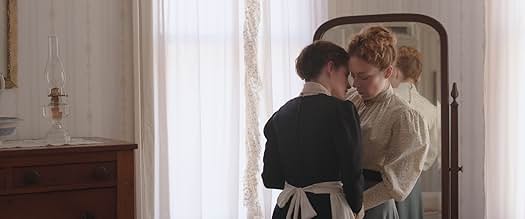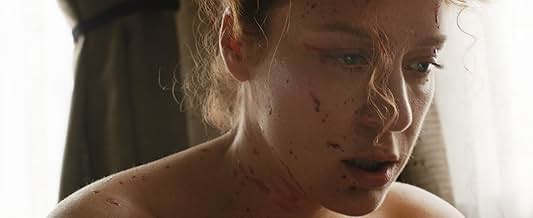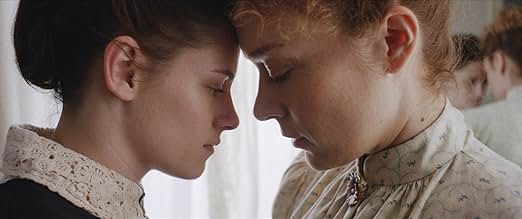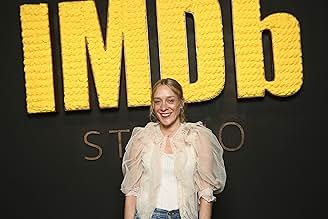PUNTUACIÓN EN IMDb
5,9/10
10 mil
TU PUNTUACIÓN
Un thriller psicológico basado en los famosos asesinatos de la familia Borden en 1892.Un thriller psicológico basado en los famosos asesinatos de la familia Borden en 1892.Un thriller psicológico basado en los famosos asesinatos de la familia Borden en 1892.
- Dirección
- Guión
- Reparto principal
- Premios
- 1 nominación en total
Reseñas destacadas
There are certain ideas that every few years get reused for major movie releases. Examining the life of Lizzie Borden happens a bit infrequently compared to other concepts, but the 2018 film 'Lizzie' isn't the first to do so, and surely won't be the last.
The tale of Lizzie Borden is fairly common knowledge at this point: she is alleged to have murdered her parents with an ax, and when put on trial for the crimes, she was acquitted. The finer details of who Lizzie was, and how and why she did it, are the real points of debate and interest, and the things that filmmakers may emphasize or deemphasize as they see fit for the picture they want to make.
'Lizzie' chooses to focus on the build-up to the murders, with little time spent on the trial and a mere few lines of text to describe Borden's life after. What we are shown is how very abusive Lizzie's father Andrew was, in almost every way a father could be. From writing off Lizzie's future to destroying those things she held dear, we're given a poor impression of Mr. Borden - and of his wife, Abby, who Lizzie resents for her inaction.
Lizzie also recognizes her father's abuse of the family's live-in servant, Irish immigrant Bridget Sullivan. In Miss Sullivan this film finds another focus as it spends some time on the developing friendship between Lizzie and Bridget. One can't ignore that 'Lizzie' undoubtedly gets more steamy than other movies about its subject, too, as it imparts an intimate, sexual relationship between Miss Borden and Miss Sullivan.
The film's bent toward salaciousness is also built into the climax when both Lizzie and Bridget take up the ax against the elder Bordens, ensuring in the process that they get no blood on their clothing.
How does the thrust of the narrative here compare to other films about Lizzie Borden? How likely is it to be an accurate depiction of those events in 1892 that we can only speculate on? I leave those questions for Lizzie enthusiasts and historians. How is 'Lizzie' in and of itself?
The number one thing to remark on are the performances. In particular, Chloe Sevigny shines as Lizzie Borden, putting in a performance that is as powerful as it is stoic. As critics have remarked, she is so steady and flatly even in her role as to almost single-handedly give the picture a great air of seriousness. She is joined in a similar manner by Kristen Stewart as Bridget Sullivan. Stewart got a lot of flak for wooden, unmoving acting in the 'Twilight' films, but I rather think that folks forget she's an actress - given the freedom and direction to embody a character as she will, Stewart is very capable. In 'Lizzie' she largely mirrors Sevigny, if anything giving Sullivan a slightly greater emotive range even as she remains resolute, and loyal to her friend and lover.
That dispassion and restraint is built into the production as well, perhaps to a fault. The whole picture feels very understated; Jeff Russo's score is so minimized that one may be forgiven for forgetting that 'Lizzie' had any music at all. To an extent I can appreciate applying such calculated dampening to what is essentially a historical reenactment, but there needs to be some variation in tone, some peaks and valleys. As it stands, even as 'Lizzie' is anchored by Sevigny and Stewart's fine performances, it's also weakened by a lack of vibrancy in even the most dramatic moments.
Hand in hand with the somewhat muted feel of the feature, there's something to be said, too, for how its treatment of the life and times of Lizzie Borden dispenses with any commentary on society at the time. That unmarried Lizzie would see her father write her out of any possible inheritance, thereby severely limiting her means, would certainly be a strong motive for murdering him. Women's rights were far more of a nightmare in the late 19th century than they are even now, with almost no agency or autonomy to speak of. Almost any other movie would acknowledge sociopolitical issues with at least a passing line of dialogue, if not an active interest of a character. 'Lizzie' leaves it to viewers to pick up on these matters by themselves. Which is fine - there's no written rule of film-making that says every last detail has to be spoon-fed to the audience, nor would I want there to be - but it's striking nonetheless.
Between the blood, violence, sexuality, and nudity, it's not going to be for everyone, and discretion is advised as well for viewers with a keen focus on historical accuracy and/or Lizzie's legacy. Yet overall, I think 'Lizzie' is a pretty good movie that effectively conveys the events of 1892 for those unfamiliar. The stony evenness of its tone is off-putting, but Chloe Sevigny and Kristen Stewart's performances alone make it worth watching.
Don't go out of your way to find it, but 'Lizzie' is worthwhile if you come across it.
The tale of Lizzie Borden is fairly common knowledge at this point: she is alleged to have murdered her parents with an ax, and when put on trial for the crimes, she was acquitted. The finer details of who Lizzie was, and how and why she did it, are the real points of debate and interest, and the things that filmmakers may emphasize or deemphasize as they see fit for the picture they want to make.
'Lizzie' chooses to focus on the build-up to the murders, with little time spent on the trial and a mere few lines of text to describe Borden's life after. What we are shown is how very abusive Lizzie's father Andrew was, in almost every way a father could be. From writing off Lizzie's future to destroying those things she held dear, we're given a poor impression of Mr. Borden - and of his wife, Abby, who Lizzie resents for her inaction.
Lizzie also recognizes her father's abuse of the family's live-in servant, Irish immigrant Bridget Sullivan. In Miss Sullivan this film finds another focus as it spends some time on the developing friendship between Lizzie and Bridget. One can't ignore that 'Lizzie' undoubtedly gets more steamy than other movies about its subject, too, as it imparts an intimate, sexual relationship between Miss Borden and Miss Sullivan.
The film's bent toward salaciousness is also built into the climax when both Lizzie and Bridget take up the ax against the elder Bordens, ensuring in the process that they get no blood on their clothing.
How does the thrust of the narrative here compare to other films about Lizzie Borden? How likely is it to be an accurate depiction of those events in 1892 that we can only speculate on? I leave those questions for Lizzie enthusiasts and historians. How is 'Lizzie' in and of itself?
The number one thing to remark on are the performances. In particular, Chloe Sevigny shines as Lizzie Borden, putting in a performance that is as powerful as it is stoic. As critics have remarked, she is so steady and flatly even in her role as to almost single-handedly give the picture a great air of seriousness. She is joined in a similar manner by Kristen Stewart as Bridget Sullivan. Stewart got a lot of flak for wooden, unmoving acting in the 'Twilight' films, but I rather think that folks forget she's an actress - given the freedom and direction to embody a character as she will, Stewart is very capable. In 'Lizzie' she largely mirrors Sevigny, if anything giving Sullivan a slightly greater emotive range even as she remains resolute, and loyal to her friend and lover.
That dispassion and restraint is built into the production as well, perhaps to a fault. The whole picture feels very understated; Jeff Russo's score is so minimized that one may be forgiven for forgetting that 'Lizzie' had any music at all. To an extent I can appreciate applying such calculated dampening to what is essentially a historical reenactment, but there needs to be some variation in tone, some peaks and valleys. As it stands, even as 'Lizzie' is anchored by Sevigny and Stewart's fine performances, it's also weakened by a lack of vibrancy in even the most dramatic moments.
Hand in hand with the somewhat muted feel of the feature, there's something to be said, too, for how its treatment of the life and times of Lizzie Borden dispenses with any commentary on society at the time. That unmarried Lizzie would see her father write her out of any possible inheritance, thereby severely limiting her means, would certainly be a strong motive for murdering him. Women's rights were far more of a nightmare in the late 19th century than they are even now, with almost no agency or autonomy to speak of. Almost any other movie would acknowledge sociopolitical issues with at least a passing line of dialogue, if not an active interest of a character. 'Lizzie' leaves it to viewers to pick up on these matters by themselves. Which is fine - there's no written rule of film-making that says every last detail has to be spoon-fed to the audience, nor would I want there to be - but it's striking nonetheless.
Between the blood, violence, sexuality, and nudity, it's not going to be for everyone, and discretion is advised as well for viewers with a keen focus on historical accuracy and/or Lizzie's legacy. Yet overall, I think 'Lizzie' is a pretty good movie that effectively conveys the events of 1892 for those unfamiliar. The stony evenness of its tone is off-putting, but Chloe Sevigny and Kristen Stewart's performances alone make it worth watching.
Don't go out of your way to find it, but 'Lizzie' is worthwhile if you come across it.
I was more impressed than I expected to be with this film. It is slower paced in the first two acts, but Sevigny and Stewart both deliver performances worth watching, and the smaller details of the story are livened up enough that I was interested throughout. With some films surrounding killers, I feel as if the moment of murder is the only interesting aspects, but with this film, Lizzie's character was compelling enough to keep me engaged throughout. There were a few shakier scenes with some minor characters, and a few scenes that felt a touch overdone, but for the most part this was a very decent film.
The acting of Chloe Sevigny, Kristen Stewart, and Jamey Sheridan carries this film, as I see it. It's the latest interpretation of what happened on August 4th, 1892, in Fall River, Massachusetts, when the sensational axe murders of Andrew and Gabby Borden occurred in their home.
The movie is quite slow paced, and has several lurid, gruesome, and violent scenes perpetrated against both humans and animals. There's also a concurrent theme of sexual molestation, as well as graphic nudity in the final 25 minutes or so of the film.
Overall, this film won't appeal to everyone and can be difficult to watch at times, but, for me, the fine acting was enough to keep me engaged.
The movie is quite slow paced, and has several lurid, gruesome, and violent scenes perpetrated against both humans and animals. There's also a concurrent theme of sexual molestation, as well as graphic nudity in the final 25 minutes or so of the film.
Overall, this film won't appeal to everyone and can be difficult to watch at times, but, for me, the fine acting was enough to keep me engaged.
Just four years after Lizzie Borden Took an Ax and the campy TV mini series it spawned, were audiences really clamoring for another Lizzie Borden film?
An uninspiring cast sleepwalks its way through this speculative take on an all-too-familiar story in Lizzie (2018), written by Bryce Kass and directed by Craig William Macneill. The film pits Lizzie Borden and the family's live-in maid, Bridget Sullivan, against her tyrannical father and unsympathetic step mother in what co-producer and lead actress Chloë Sevigny described as an overtly feminist take.
The film opens in the aftermath of Andrew (Jamey Sheridan) and Abby (Fiona Shaw) Borden's murder. An investigator asks their 32-year-old daughter, Lizzie (Chloë Sevigny), whether her father had any enemies. From there, the film rewinds to the family's employment of a 25-year-old Irish maid named Bridget Sullivan (Kristen Stewart). According to the filmmakers, that was the catalyst for the eventual double homicide, and the answer to the investigator's question. There is never a question about Lizzie Borden's involvement in her parent's death. The obvious foil, and rival for Lizzie's inheritance, her uncle John Morse (Denis O'Hare), serves as a flimsy red herring.
Lizzie's central conflict is between Lizzie, Bridget, and her domineering father, who seeks to control all the women living under his roof. While Lizzie's sister, Emma (Kim Dickens), fades into the background, Lizzie and Bridget find themselves in a compromising position, one that leads to her parents' gruesome murder. Sevigny herself characterized this as a literal "smash the patriarchy" moment.
In real life, Andrew and Sarah Borden were found murdered in their Fall River, Massachusetts home on August 4, 1892. Their middle aged daughters, Lizzie and Emma, lived with them, along with their maid, Bridget Sullivan. There had been significant tension in the family leading up to the murders, and Lizzie gave conflicting alibis. Lizzie was arrested and put on trial. After 90 minutes of deliberation, the all-male jury acquitted her. Her trial was a national media sensation, but to this day, there are many competing theories about "whodunnit."
Like most dramatizations of these events, Lizzie both assumes Lizzie Borden was guilty and that she committed the murders with an ax. In reality, the murder weapon was never determined, though the movie does try to explain why the hatchet in question lacked any evidence of being used in the crime. The film also omitted the food poisoning the family suffered, and the extended trip Lizzie and her sister took prior to the murders. Although the house interior looked accurate, the exterior bears little resemblance to its historic counterpart.
There's also no evidence Lizzie was a lesbian or that she was sexually involved with Bridget Sullivan, or that Mr. Borden sexually assaulted Bridget. That allegation came from mystery author Evan Hunter (aka Ed McBain)'s 1984 novel Lizzie, a work of fiction. Contemporary rumors about Lizzie's sexuality were of the kind gossipers leveled at any unmarried, middle-aged person at the time.
Like Lizzie, Lifetime's biopic Lizzie Borden Took an Ax (2014) also weirdly sexualizes her. Both films depict her as a seductress and show her committing the murders in the nude and drinking alcohol. Lizzie Borden was, in real life, an upper class spinster, Sunday school teacher, teetotaler, and member of the Women's Christian Temperance Union.
Their contemporary revision of Lizzie Borden's personality is where the two films part ways. For all its faults, Lizzie Borden Took an Ax at least accurately portrayed Lizzie and her sister Emma's close relationship, while in Lizzie, Emma vanishes for most of the film. Their actual family dynamic was sidelined to make room for a lesbian fantasy, which at this point is such a boring cliche in feminist film.
Lizzie grossed $642,157 at the box office, and currently holds a 65% rating from critics and 56% audience favorability on RottenTomatoes. The filmmakers were obviously hoping controversy and its two leading ladies would carry their film, but even a contractually-obligated effort on the part of Chloë Sevigny and Kristen Stewart couldn't save this dreary rehash of a 126-year-old unsolved murder.
An uninspiring cast sleepwalks its way through this speculative take on an all-too-familiar story in Lizzie (2018), written by Bryce Kass and directed by Craig William Macneill. The film pits Lizzie Borden and the family's live-in maid, Bridget Sullivan, against her tyrannical father and unsympathetic step mother in what co-producer and lead actress Chloë Sevigny described as an overtly feminist take.
The film opens in the aftermath of Andrew (Jamey Sheridan) and Abby (Fiona Shaw) Borden's murder. An investigator asks their 32-year-old daughter, Lizzie (Chloë Sevigny), whether her father had any enemies. From there, the film rewinds to the family's employment of a 25-year-old Irish maid named Bridget Sullivan (Kristen Stewart). According to the filmmakers, that was the catalyst for the eventual double homicide, and the answer to the investigator's question. There is never a question about Lizzie Borden's involvement in her parent's death. The obvious foil, and rival for Lizzie's inheritance, her uncle John Morse (Denis O'Hare), serves as a flimsy red herring.
Lizzie's central conflict is between Lizzie, Bridget, and her domineering father, who seeks to control all the women living under his roof. While Lizzie's sister, Emma (Kim Dickens), fades into the background, Lizzie and Bridget find themselves in a compromising position, one that leads to her parents' gruesome murder. Sevigny herself characterized this as a literal "smash the patriarchy" moment.
In real life, Andrew and Sarah Borden were found murdered in their Fall River, Massachusetts home on August 4, 1892. Their middle aged daughters, Lizzie and Emma, lived with them, along with their maid, Bridget Sullivan. There had been significant tension in the family leading up to the murders, and Lizzie gave conflicting alibis. Lizzie was arrested and put on trial. After 90 minutes of deliberation, the all-male jury acquitted her. Her trial was a national media sensation, but to this day, there are many competing theories about "whodunnit."
Like most dramatizations of these events, Lizzie both assumes Lizzie Borden was guilty and that she committed the murders with an ax. In reality, the murder weapon was never determined, though the movie does try to explain why the hatchet in question lacked any evidence of being used in the crime. The film also omitted the food poisoning the family suffered, and the extended trip Lizzie and her sister took prior to the murders. Although the house interior looked accurate, the exterior bears little resemblance to its historic counterpart.
There's also no evidence Lizzie was a lesbian or that she was sexually involved with Bridget Sullivan, or that Mr. Borden sexually assaulted Bridget. That allegation came from mystery author Evan Hunter (aka Ed McBain)'s 1984 novel Lizzie, a work of fiction. Contemporary rumors about Lizzie's sexuality were of the kind gossipers leveled at any unmarried, middle-aged person at the time.
Like Lizzie, Lifetime's biopic Lizzie Borden Took an Ax (2014) also weirdly sexualizes her. Both films depict her as a seductress and show her committing the murders in the nude and drinking alcohol. Lizzie Borden was, in real life, an upper class spinster, Sunday school teacher, teetotaler, and member of the Women's Christian Temperance Union.
Their contemporary revision of Lizzie Borden's personality is where the two films part ways. For all its faults, Lizzie Borden Took an Ax at least accurately portrayed Lizzie and her sister Emma's close relationship, while in Lizzie, Emma vanishes for most of the film. Their actual family dynamic was sidelined to make room for a lesbian fantasy, which at this point is such a boring cliche in feminist film.
Lizzie grossed $642,157 at the box office, and currently holds a 65% rating from critics and 56% audience favorability on RottenTomatoes. The filmmakers were obviously hoping controversy and its two leading ladies would carry their film, but even a contractually-obligated effort on the part of Chloë Sevigny and Kristen Stewart couldn't save this dreary rehash of a 126-year-old unsolved murder.
"Lizzie" (2018 release; 105 min.) is a bio-pic about Lizzie Borden. As the movie opens, we are told it is "August 4, 1892", and we see Lizzie walking around in the garden, and then going into the house, where we hear her scream and the camera shows a heavily mutated slain body. We then go to "6 Months Earlier", as we get to know Bridget, an Irish girl who has gotten work as a maid in the Borden family that is ruled with an iron fist by Lizzie's dad. Lizzie and Bridget strike up an unlikely friendship... To tell you more of the plot would spoil your viewing experience, you'll just have to see for yourself how it all plays out.
Couple of comments: this is the 2nd feature length from up-and-coming director Craig William Macneill. Here he brings the latest Lizzie Borden movie adaptation (it'e been a TV movie several times over). While this is in a sense a "whodunnit" movie, as we are eager to find out exactly what happened on that August 4, 1892, it really is far more than that: Macneill is interested in showing us the atmosphere within which the Borden family (and maid) were living in. Bware: almost the entire film plays out in the Borden house, so at times this very much has the feeling of a stage play. On top of that, the music is sparse. It all has a bit of a claustrophobic feel to it. But the most important thing the movie has going for it are the terrific performances from the two lead actresses, Chloe Sevigny (who also co-produced) and Kristin Stewart. Yes, Stewart at times uses her patented "pained look", at quite effectively within the circumstances.
"Lizzie" premiered at this year's Sundance film festival, to positive buzz. It finally opened this weekend at my local art-house theater here in Cincinnati, and I couldn't wait to see it. The Sunday early evening screening where I saw this at was attended dismally (3 people, including myself). If you are interested in a decent character study set in the late 19th century and blesses with some wonderful acting performances, I'd readily suggest you check this out, be it in the theater, on VOD, or eventually on DVD/Blu-ray, and draw your own conclusion,
Couple of comments: this is the 2nd feature length from up-and-coming director Craig William Macneill. Here he brings the latest Lizzie Borden movie adaptation (it'e been a TV movie several times over). While this is in a sense a "whodunnit" movie, as we are eager to find out exactly what happened on that August 4, 1892, it really is far more than that: Macneill is interested in showing us the atmosphere within which the Borden family (and maid) were living in. Bware: almost the entire film plays out in the Borden house, so at times this very much has the feeling of a stage play. On top of that, the music is sparse. It all has a bit of a claustrophobic feel to it. But the most important thing the movie has going for it are the terrific performances from the two lead actresses, Chloe Sevigny (who also co-produced) and Kristin Stewart. Yes, Stewart at times uses her patented "pained look", at quite effectively within the circumstances.
"Lizzie" premiered at this year's Sundance film festival, to positive buzz. It finally opened this weekend at my local art-house theater here in Cincinnati, and I couldn't wait to see it. The Sunday early evening screening where I saw this at was attended dismally (3 people, including myself). If you are interested in a decent character study set in the late 19th century and blesses with some wonderful acting performances, I'd readily suggest you check this out, be it in the theater, on VOD, or eventually on DVD/Blu-ray, and draw your own conclusion,
¿Sabías que...?
- CuriosidadesThe photograph in the locket that the fictional Lizzie's father gives her is of the real Lizzie Borden's mother Sarah. She died when Lizzie was a baby.
- PifiasThe end of the film states that Emma and Lizzie had a rift "soon after" the trial and became estranged, but it was actually 12 years later that Emma separated from Lizzie and moved out of their house forever. No one knows for sure what the rift was about, but it's believed by many that Emma discovered Lizzie really was guilty of the murders.
- Citas
Bridget Sullivan: What was I to you? I don't know who you are.
Lizzie Borden: Were you better off before? Is that it?
- Banda sonoraEbben? Ne Andrò Lontana From 'La Wally', Act I
Written by Alfredo Catalani
Performed by Maria Luigia Borsi and the London Symphony Orchestra, conducted by Yves Abel
Courtesy of Naxos
By arrangement with Source/Q
Selecciones populares
Inicia sesión para calificar y añadir a tu lista para recibir recomendaciones personalizadas
- How long is Lizzie?Con tecnología de Alexa
Detalles
Taquilla
- Recaudación en Estados Unidos y Canadá
- 642.157 US$
- Fin de semana de estreno en EE. UU. y Canadá
- 47.580 US$
- 16 sept 2018
- Recaudación en todo el mundo
- 844.786 US$
- Duración
- 1h 45min(105 min)
- Color
- Relación de aspecto
- 2.39 : 1
Contribuir a esta página
Sugerir un cambio o añadir el contenido que falta






































